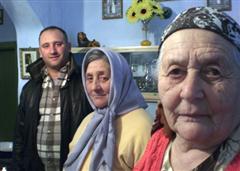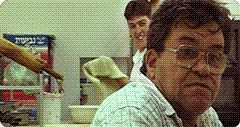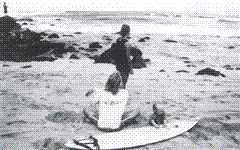Code Name Silence opens a wound and reveals the best kept secret of Israel’s Ethiopian community, a secret which has been concealed for years. In 1985, Operation Moses brought some 8,000 Ethiopian Jews to Israel via Sudan. Twenty years later, the journalist Danny Adino Abeba, ten years old at the time of the operation, sets about breaking a silence shared by community members, the Jewish Agency, and the Mossad (Israel Secret Intelligence Service). In order to carry out its daring mission, the Mossad chose members of the Ethiopian community and formed a rescue committee-the “Komita.” This committee supervised the distribution of money, medicine, and food in the Sudanese-based transit camps. While most committee members endangered their lives and the lives of their families for the sake of the operation, other members terrorized their brothers in their most difficult hour. They are suspected of sexual abuse, taking bribes when making immigration lists, and using Mossad money for personal aims. Everybody knew — and everybody kept quiet. Those responsible for the crime were never brought to justice. Code Name Silence is the story of heroes who abused their power and became criminals. At the same time, it reveals the pain of the victims and the scars still borne by thousands of Ethiopian Jews living in Israel today.
This documentary relates the stories of two Ethiopian Jews whose mothers were left behind during the 1991 Israeli airlift of 14,000 Ethiopians. Paulus (19) and Rachel (20) tell their stories, these children of war sent to Israel “to have a better life.” They served in the Israeli army. They studied for advanced degrees. They settled in Tel Aviv. As we accompany them back to Africa, we see the poverty, the marketplace unchanged for thousands of years, the mules ladden with produce and the women balancing bundles on their heads. To the 3,000 Ethiopian Jews still hoping to emigrate, Israel is like America. It is, after all, the original promised land.
Director Ohad Ufaz explains that, “[he] filmed the movie as Daphna’s partner, escorting her on a quest through lands and cultures, memories and hopes, anger and forgiveness, a jourey towards a mother’s love.” Daphna has two Dutch mothers. Her biological mother Lillian left Israel and went back to Holland when Daphna was three years old. Daphna stayed with her Israeli father Haim and her stepmother Yoke, who is also Dutch. [Daphna and Ohad] wanted to have a child, but it was clear that Daphna had to go and live beside her mother before she could become a mother herself. Going Dutch is the story of Daphna’s journey to Holland. To try to belong to the world she would have belonged to had she gone with her mother back then, a world that could be the reality of her children. But trying to fit in with the Dutch “world” is not easy, trying to get close to Daphna’s mother after so many years is hard and the stork [Daphna and Ohad are] looking for is in no hurry.
A journey of self-discovery and redemption, filmmaker Jorge Weller travels back to his native Argentina, which he left twenty-two years earlier in order to immigrate to Israel. With film crew in tow, he helps care for his ailing father and developmentally disabled younger sister and eventually comes to understand the meaning of home and family.
With humor and irony, in a style of a tale, using an original mix genre language, the film tells the story of a Romanian worker who realizes his Jewish roots can spin his fortune wheel around as his Palestinian friends reveal to him the amazing advantages of a Jewish grandmother.
Maksim, a pizza wizard addicted to sleep, asks his parents to help him buy a pizza place he co-owns. As soon as he becomes the sole owner, his parents realize they will have to invest in it a whole lot more than just the money. Soon enough, the father becomes a delivery boy and the mother, an oven cleaner. Between taking care of the family, work and maintening the pizza place, the parents ask themselves: is their role as parents a job for life? The film creates a true profile of the average Israeli family in the new millennium.
Guy Bukaee was two years and four months old when his father Rafi died in December 2003. When he turned 10 he decided to get to know his father before his memories fade and disappear. Rafi Bukaee directed only three films, among them the significant “Avanti Popolo,” and was one of the dominant figures to revitalize Israeli cinema in the 1980s. The film describes Guy’s journey to his father. Meetings and scraps of information he collects about his father are interwoven with dramatic scenes staged exclusively for this film by Assi Dayan and Gidi Dar. The final scene was directed by 10 year old Guy with the help of his friends.
In 1962, Mazud and Aliza Deri left Morocco to start a new life in Yerucham . Here they built a home, raising a large closely-knit family with a strong faith and unalterable rules and rituals. Their youngest son David, the director of this documentary, does not fit in with their conservative notions about life, however. They find the fact that he’s homosexual entirely unacceptable. Stubbornly, the members of the Deri family wait for him to see the light and hope for the day when he will finally introduce them to his bride. David visits them during important religious holidays and at other occasions, capturing a very vivid dialogue on the subject of his sexual orientation. For the most part, David hides behind the camera, which for him and the audience becomes a gateway into his inner self. He makes few comments and allows the audience to share his fate and become better acquainted with his family and its attitudes, provoking general questions about contemporary society. The film examines what it means to be different, and the consequences, exploring the relationship between hypocrisy and truth, reason and emotion, blind faith and freedom of choice. It is also an insight into the nature of any closed community or any kind of conservatism. Beneath the joyful heartbeat of family life there’s always a note of melancholy. David’s personal search for happiness inevitably leads to his exclusion from the community that means so much to him.
This is the story of five remarkable women who independently leave their comfortable, city lives to pursue the ideological struggle of the settler movement. The closest of friends, these women kept a yearly ritual of taking a holiday together for over 14 years. Two years ago a terrorist murdered one of them, shattering the group. Three got divorced, all left the settlement. The film “Sisters In Arms” brings the four remaining women back to their traditional vacation. All four are now equipped with a more sober outlook and some self-criticism as they examine issues of identity, belonging and alienation.




